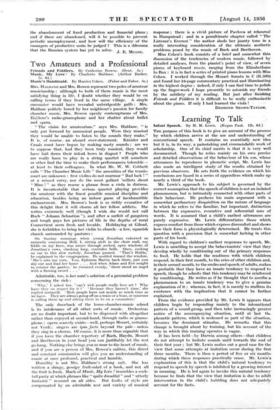Soviet Finance
IN recent years many, authors have described social conditions and economic organisation in Russia. At the same time theoretical economists have discussed fully the problems of money and prices in a planned economy. But there has been a real need for a book that both describes and analyses these problems scientifically in view of the Russian experience: In his short book The. Russian Financial System Mr. Reddaway went some way to fill this need ; but Mr. Hubbard has now provided a more complete and detailed analysis. After a short financial history of Russia since the revolution and an excellent description of the present Russian banking institu.-.
tions, he analyses the principles of the Russian monetary and pricing system.
In assessing the advantages of - capitalist " and socialist " systems, three questions are of paramount importance. Which system can achieve the better distribution of income ? Which can more easily avoid unemployment ? Which is more efficient in producing those goods which consumers desire ? The distribution of income falls outside the scope of Mr. Hubbard's enquiry, but he has much of interest to say on the other problems. Socialists argue that, if the State can directly control the sum to be spent on capital development and the sum to be distributed to individuals for expenditure on consumption, the total demand for com- modities need never fall below that required to give hill employment. Mr. Hubbard gives full weight to this argu- ment. But he adds that the Russian success in avoiding unemployment is not conclusive ; for in the last few years this may be explained by the abnormally rapid rate of capital development.
There is a full discussion in this book of the efficiency of the Russian planned economy in satisfying consumers' needs'. Since the first Five Year Plan every industry has been subject to a detailed production plan, which has regulated its output and its use of raw materials, &c., and also to a financial plan, which has regulated the amount to be spent on each raw material or factor of production. At the same time prices have been fixed for capital goods and for con- sumption goods, the supplies of which have been rationed to consumers. The financial plan has served to maintain the efficiency of industrial management. If the banks exercise a strict control over the amount that a manager can spend at the fixed price on each raw material, any wastage in, production must show itself in a failure to produce the planned output.
But does this system ensure that consumers obtain as much as possible of the goods which they want ? In a capitalist " system consumers are free to express their desires by offering different prices in the market for different commodities ; and the producers in the search of profit are free to attract the factors of production to make those com- modities for which consumers offer most. Since January, 1936, the rationing of consumption goods has been abolished, and the prices offered by Russian consumers are now a measure of their preferences. Mr. Hubbard gives sonic evidence that this freedom of prices may be extended to other markets. Early in 1935 the sale of tractor spare parts to the State farms was put on a commercial basis ; for when the prices and outputs of these parts were arbitrarily fixed, there was no assurance that the most needed parts would be produced. In theory the different productive units of a socialist economy can " play at competition," and compete with one another in a free market for the different factors of production ; and this might combine the advantages of " capitalism " with those of " socialism." But this involves
the abandonment of fixed production- and financial plans ; and if these are abandoned, will it be possible to prevent periodic unemployment, and how will the efficiency of the managers of productive units be judged ? This is a dilemma that the Russian system has yet to solve. J. E. MEADE.







































 Previous page
Previous page